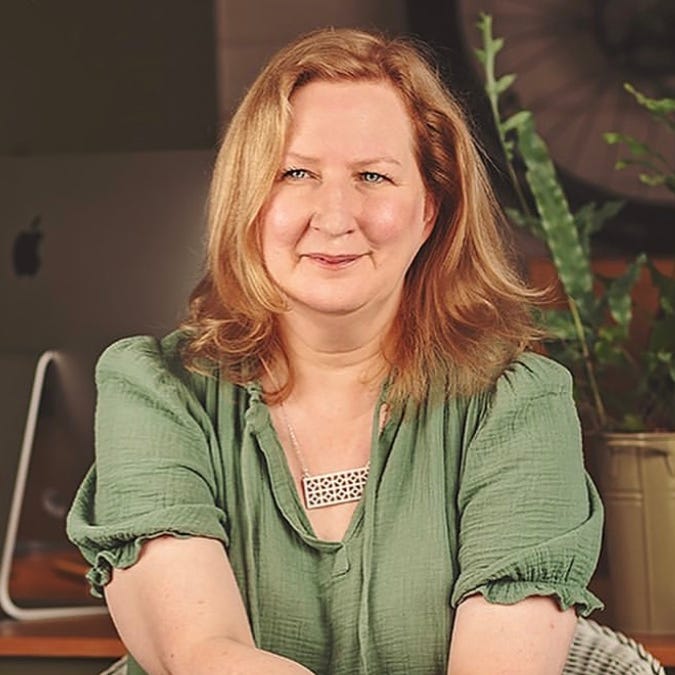I’d like to earn enough so that I don’t really think about money so much.
Decades series: fifties
Hi and welcome to The Ladybird Purse, my weekly newsletter about women and money.
This is the fifth post in my series looking at money experiences and attitudes through life, decade by decade. You can find links to the previous posts at the end.
Fifties
Sarah Raad, 51
Sarah Raad is a mindset & business coach.
She helps creative women to build and run their creative lives on their own terms so that they can take up more space and have more of what they want. She offers 1:1 coaching and also runs two group programmes for creatives and a paid membership on Substack.
Sarah’s background is in cultural/ heritage marketing & PR which she did for 12 years and she has been a small business owner and qualified coach since 2007.
How were financial decisions made within your family when you were growing up?
Ooh that’s hard to say really! I was raised mainly by my mum after my parents divorced when I was about 7 years old and by her partner Maggie – they’ve been together since 1981 and I have two mums essentially which is fun!
So I guess mum took the lead on all that because she had to and had us three children to consider, although in my early childhood up to my teens there simply wasn’t much money around in our household anyway, which I was very aware of.
But people didn’t sit around talking about money, bills came in, they got paid, we saved for things we wanted and needed and often went without anything more than that.
What did your parents teach you about money? Intentionally or otherwise.
Some negative stuff comes up around money being hard to come by, the rich just get richer, rich people not being generous, lots of class stuff about working class people being exploited over the years by the higher ups – which clearly is routed in fact!
Not much sense that it was possible for me to be well off as a grown up, but money wasn’t what we aspired to, we aspired to education, being bright, having purpose, doing something useful with our lives, being a good person.
I was also taught that money wasn’t the be all and end all of everything, that lots of things in life are more important like love, friendship, community, nature, having meaning and purpose in life, and that essentially ‘money won’t buy you happiness’, which I think is mainly true, though I do feel that money buys you security which is something that has an impact on my wellbeing.
I think there are drawbacks to some of my childhood money mindset and whilst I don’t blame my parents for any of it as I was secure and loved and none of it was intentional stuff, it’s made me more aware of what ideas and attitudes I am passing on to my child. He’s got a very entrepreneurial spirit and always asks for what he wants.
Did you experience any financial challenges when you started your career?
I did get into a small amount of debt in my early twenties, nothing major, maybe £1500 on a credit card at one point? I just wanted to have fun and my first job whilst hugely fulfilling wasn’t well paid, I earned about £10k in 1995! Though my rent was only £87 a month!
But I fell in with a boy, who is now my husband, who knew all about budgets and spreadsheets from his parents (who, surprise, surprise were wealthier than mine hence the fiscal info!) and I quickly learned to manage my money, pay off the debt and save and what all those financial terms meant.
I learned to be a saver from him which is the biggest thing, and to make sure I had money to cover expected and unexpected life events. So for example when my husband left his job to set up a business, we knew my wage would cover us for all the bills and the mortgage, keep the cars, etc., and we also had savings specifically to cover his expenses for a few months, should he not earn (he did immediately so it was all fine).
When I did the same, I had six months of basic bills, etc., money set aside for the same purpose.
We have also more or less always saved a little each month for general savings, we also save for car expenses like servicing and insurance, holidays, things like that, with money being set aside each month unless we absolutely can’t.
We are also saving now for our son in case he wants to go to university or start a business when he leaves school. It’s not a big pot now but it’s growing and we have three years until he hits 18.
I like saving and if someone gave me £10k now as a windfall my first thought would be how I could best save or invest that rather than what should I spend that on. I then might spend some and save the rest but that would be my go-to! Where can I put this, so it turns into more…
How has your perspective on money changed over time?
I see having money as being possible for me. I don’t think it’s for ‘other people’ and I don’t feel my class or gender is a barrier to anything to do with money, not really.
But I still don’t value it as the most important thing in life either. I used to get really stressed about money, but I am a bit more relaxed now – though not totally. We always seem to find money and make money. Both being self-employed is a bit hairy in that sense, but we always get there!
We’ve had times in the past where we have been REALLY strapped and quite worried, but then it rights itself and I think I believe it always will.
But I am still very thrifty, I buy a lot of things on Vinted for example, we always shop around for everything we buy, look at deals and discounts. I like a bargain; I feel like I rarely pay full price for anything.
Are there any financial goals or milestones you would still like to achieve?
Yes, pay off mortgage on our home as soon as possible, because so much of what you pay is interest, earn £75k a year (just in my business) have evergreen/passive products that don’t rely on my delivery as a coach, own a holiday home again, but not to rent out, just for us, earn enough whilst working 3 days – I work 4 currently.
I’d like to earn enough so that I don’t really think about money so much because whilst we are secure, we are not ‘comfortable’ in that sense of just being free about spending money and having things and I’d like to be.
But I don’t want a bigger house or to drive flash cars and things like that. I’m not interested. I would like to but as many houseplants, books and lunches out as I like though and always make sure my kid has what he needs no matter what.
What are the biggest lessons you've learned about managing money?
That it’s best to face it head on. I’m still not total there with that, but it doesn’t make life easier to just ignore it especially stuff around investments and pensions and of course debt should always be dealt with, which thankfully has not really been an issue for me beyond mortgages.
And that by being clever you can grow money and make money without tonnes of ‘hard work’.
Have you encountered any gender-specific financial challenges or biases?
Yeah, they’re everywhere aren’t they.
And even in my own life and marriage my husband has a far better handle on the money situation and household finances than me – but I think it’s because I find money a bit stress overall and he just seems better at it – which I think is just a story.
I never got any stories about money and gender from my mums though or in my family, but it’s all played out all over society so it’s hard not to be influenced by that.
How are you approaching saving for retirement or planning for the future?
This is where is falls apart slightly! I don’t have a traditional pension; well, I have a very small pot from my early career and my husband has one that’s worth more than mine but still isn’t sufficient as a top up to what the state might give.
But we have a portfolio of property (seven in total) which we don’t manage ourselves and makes no income other than to cover interest only mortgages and insurance, but we have deposit money invested in that, the 15% or so we put down for each when we bought them and hopefully will have some equity by the end of it.
We also had a holiday cottage for about 10 years which didn’t generate that much income and was a lot of work but did create a little equity which after capital gains went to pay off some of our mortgage.
I don’t really want to retire fully anyway, I’d get bored, but now we are in our early 50s, our next big set of business and life decisions are around a retirement fund for that period and creating income streams for then as well as for now. We had a chat with our IFA recently and we now need to come up with ideas and the plan!
We also have money invested in a small portfolio which grows a bit each year and we add to that when we can.
What advice would you give to younger generations of women when it comes to finances?
Start a pension in your early twenties!
Don’t rely on other people to look after money for you, not entirely, always know where you are with it. Take advice from IFAs and trusted people who invest, etc. See investment and saving as a fun thing to do and do as much as you can while still enjoying life.
When you have savings and a bit of future proofing, you can then take risks like leave unfulfilling jobs, or change career, or start a business or take a sabbatical. It gives you options and you always want options.
Paid subscriptions enable me to keep writing these newsletters. If you’re not a paid subscriber already, I’d love it if you’d consider upgrading. (And if you are, thank you, I love you.)
If you would like a paid sub, but can’t afford it right now, email me and I’ll sort it.












Thanks for having me Keris! Writing this actually helped to shift my money mindset a bit as I am not nearly as bad as I tend to think I am - I also sound like a proper grown up!
I'd recommend people read Keris' Substack and this series about attitudes to money from different decades, really good stuff.
Savings and a bit of future proofing = taking risks etc 👍🏻👍🏻👍🏻 Oh yes! Will never forget handing in my resignation letter, only for my headteacher to give it back and tell me I couldn’t afford to quit. To which I handed back the letter and said “Yes, I can. Would you like to know how much money I have…?” What a moment! 🤣 Loved this interview, it gave me some ideas because my finances are in dire need of an overhaul at the moment.